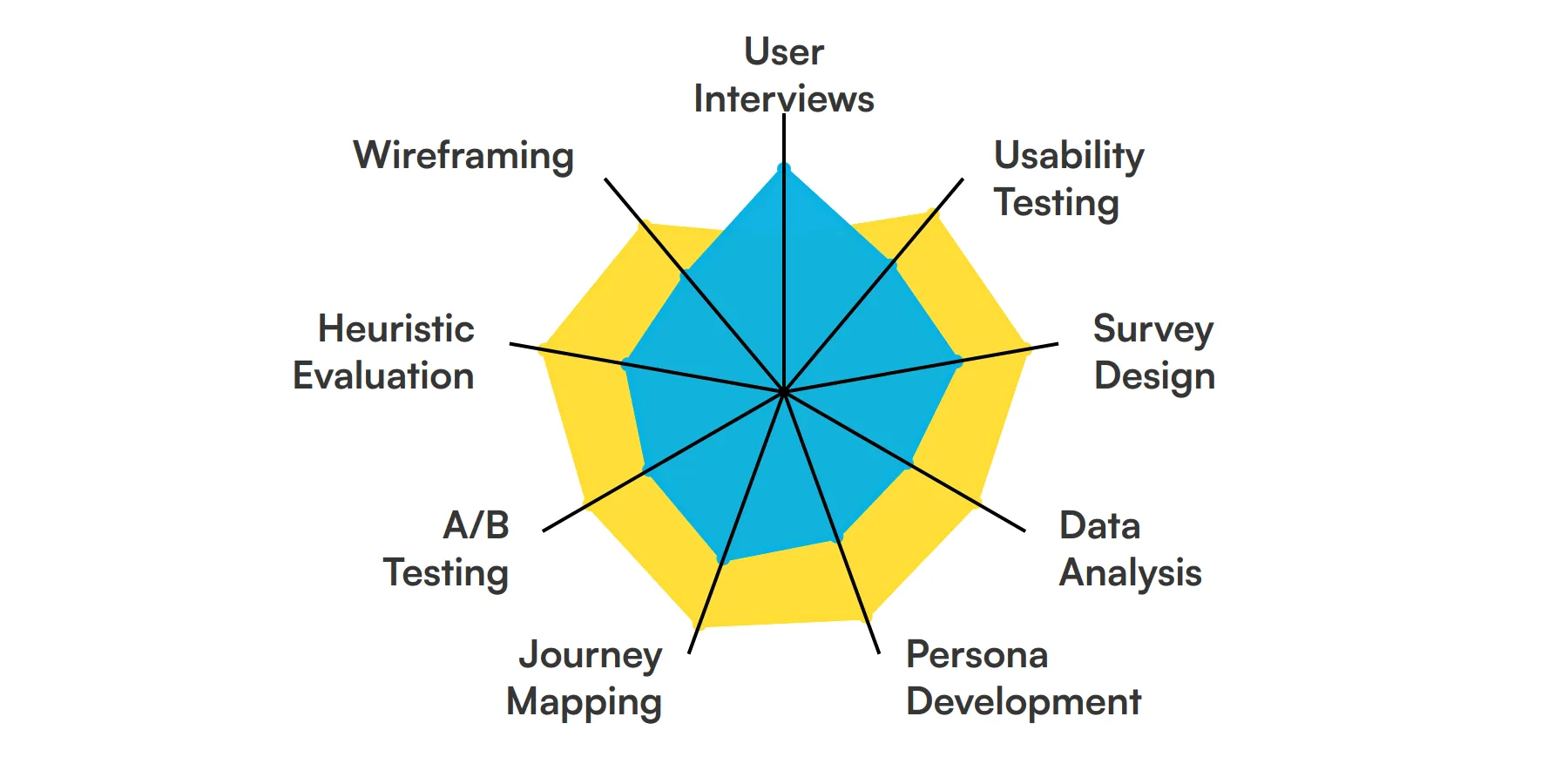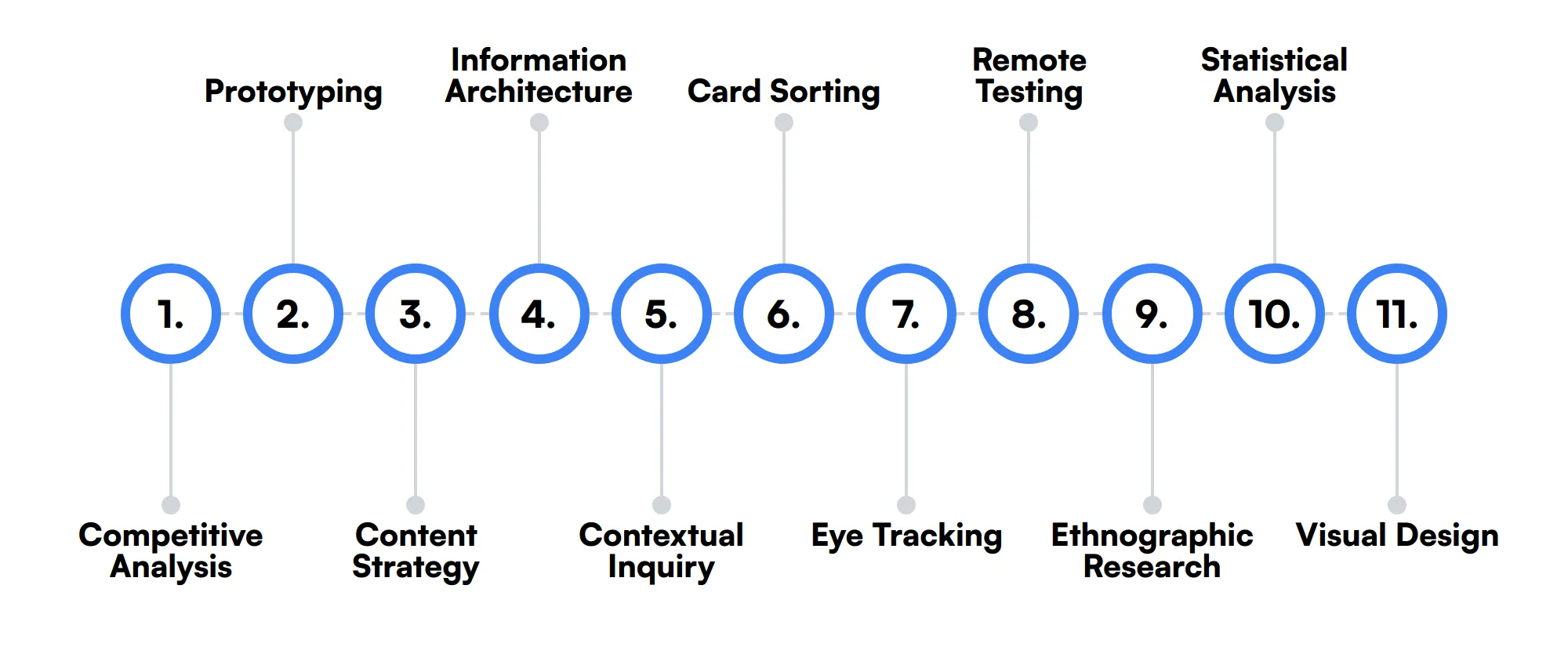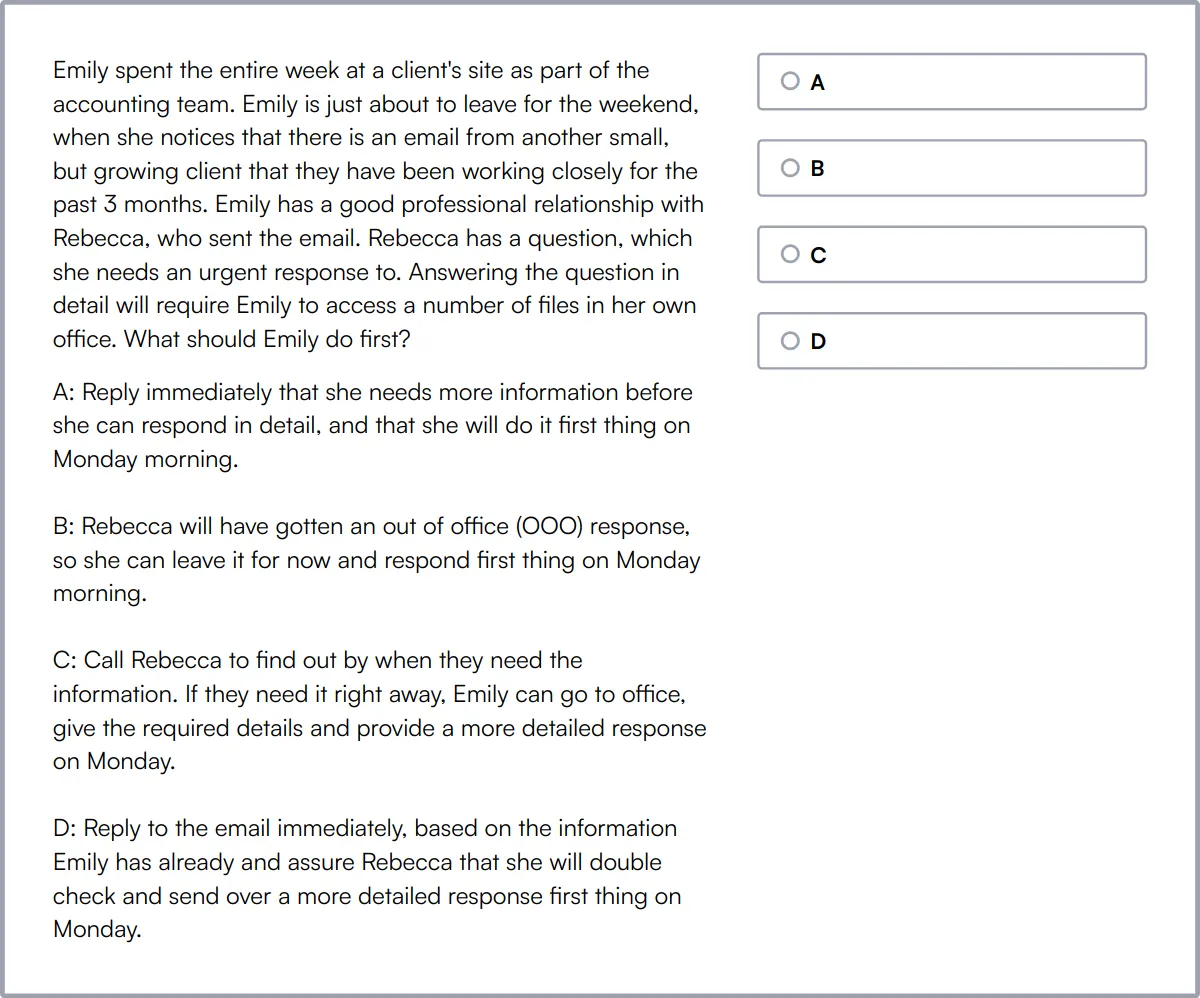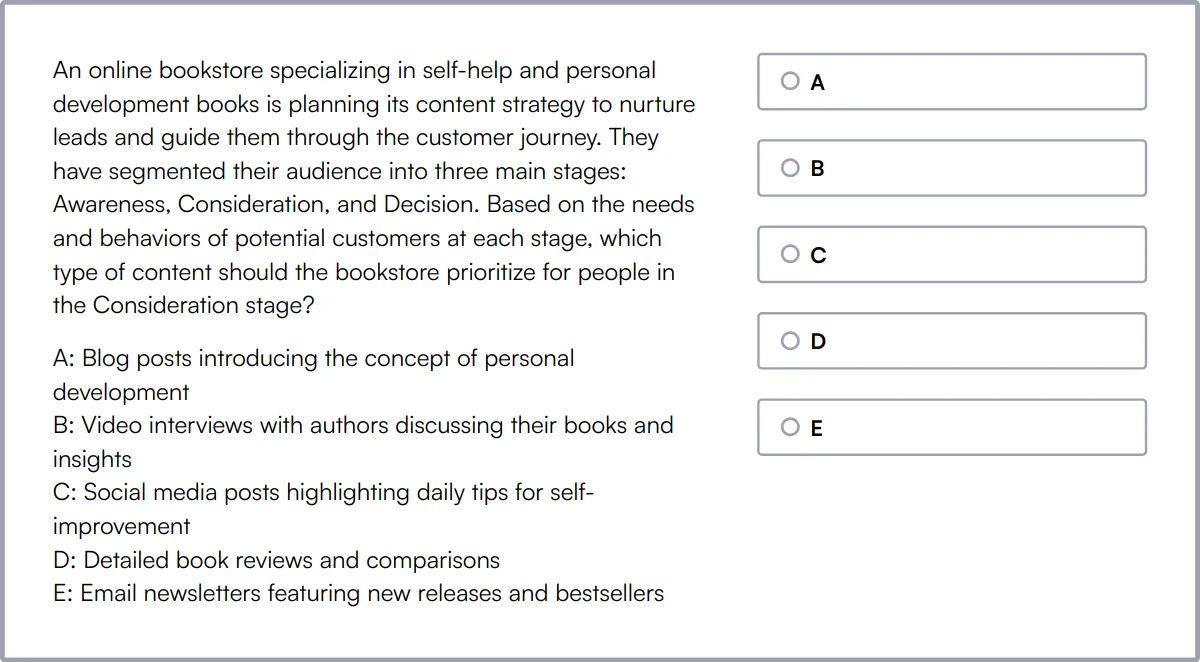UX Researchers play a key role in understanding user needs and behaviors. They gather insights that inform design decisions, ensuring that products are user-friendly and meet the needs of the target audience.
Skills for a UX Researcher include proficiency in research methodologies, data analysis, and user testing, as well as strong communication and empathy.
Candidates can write these abilities in their resumes, but you can’t verify them without on-the-job UX Researcher skill tests.
In this post, we will explore 9 essential UX Researcher skills, 11 secondary skills and how to assess them so you can make informed hiring decisions.
Table of contents
9 fundamental UX Researcher skills and traits
The best skills for UX Researchers include User Interviews, Usability Testing, Survey Design, Data Analysis, Persona Development, Journey Mapping, A/B Testing, Heuristic Evaluation and Wireframing.
Let’s dive into the details by examining the 9 essential skills of a UX Researcher.

User Interviews
Conducting user interviews helps UX researchers gather qualitative data directly from users. This skill is crucial for understanding user needs, pain points, and behaviors, which can inform design decisions and improve user experience.
For more insights, check out our guide to writing a UX Researcher Job Description.
Usability Testing
Usability testing involves observing users as they interact with a product to identify usability issues. UX researchers use this skill to ensure that the product is intuitive and meets user expectations, leading to a more seamless user experience.
Survey Design
Creating effective surveys allows UX researchers to collect quantitative data from a larger audience. This skill helps in understanding user preferences, behaviors, and satisfaction levels, which can guide product improvements.
Data Analysis
Analyzing data is essential for interpreting the results of user research. UX researchers use this skill to identify patterns, draw insights, and make data-driven recommendations for enhancing the user experience.
Check out our guide for a comprehensive list of interview questions.
Persona Development
Developing user personas involves creating detailed profiles of target users based on research data. This skill helps UX researchers and design teams keep the user's needs and goals in mind throughout the design process.
Journey Mapping
Journey mapping visualizes the user's experience with a product or service over time. UX researchers use this skill to identify touchpoints, pain points, and opportunities for improvement in the user journey.
A/B Testing
A/B testing involves comparing two versions of a product to determine which performs better. UX researchers use this skill to make informed decisions about design changes and optimize the user experience.
Heuristic Evaluation
Heuristic evaluation is a method for identifying usability problems in a user interface. UX researchers use this skill to assess a product against established usability principles and recommend improvements.
Wireframing
Wireframing involves creating low-fidelity representations of a product's layout. UX researchers use this skill to communicate design ideas and gather feedback early in the development process.
For more insights, check out our guide to writing a UI/UX Designer Job Description.
11 secondary UX Researcher skills and traits
The best skills for UX Researchers include Competitive Analysis, Prototyping, Content Strategy, Information Architecture, Contextual Inquiry, Card Sorting, Eye Tracking, Remote Testing, Ethnographic Research, Statistical Analysis and Visual Design.
Let’s dive into the details by examining the 11 secondary skills of a UX Researcher.

Competitive Analysis
Understanding the competitive landscape helps UX researchers identify industry trends and benchmark their product against competitors. This skill can inform strategic decisions and highlight areas for differentiation.
Prototyping
Creating interactive prototypes allows UX researchers to test design concepts and gather user feedback before full-scale development. This skill helps in refining ideas and ensuring they meet user needs.
Content Strategy
Developing a content strategy ensures that the information presented to users is clear, relevant, and engaging. UX researchers use this skill to enhance the overall user experience through effective communication.
Information Architecture
Organizing and structuring content in a way that makes sense to users is key to a good user experience. UX researchers use this skill to create intuitive navigation and improve findability.
Contextual Inquiry
Contextual inquiry involves observing users in their natural environment to understand how they interact with a product. This skill provides deep insights into user behavior and context of use.
Card Sorting
Card sorting is a technique used to understand how users categorize information. UX researchers use this skill to inform the structure of information and improve navigation.
Eye Tracking
Eye tracking technology helps UX researchers understand where users focus their attention on a screen. This skill can reveal insights into user behavior and inform design improvements.
Remote Testing
Conducting remote usability tests allows UX researchers to gather feedback from users who are not physically present. This skill is useful for reaching a diverse audience and collecting data efficiently.
Ethnographic Research
Ethnographic research involves studying users in their real-life context. UX researchers use this skill to gain a deep understanding of user behaviors, needs, and cultural influences.
Statistical Analysis
Applying statistical methods to research data helps UX researchers validate findings and make informed decisions. This skill is important for ensuring the reliability and accuracy of research results.
Visual Design
While not the primary focus, having a basic understanding of visual design principles can help UX researchers communicate ideas more effectively and collaborate with design teams.
How to assess UX Researcher skills and traits
Assessing the skills and traits of a UX Researcher involves more than just glancing at their resume. It's about understanding how well they can apply their knowledge of user interviews, usability testing, survey design, and other key areas to real-world scenarios. This ensures they can effectively gather and analyze user data to enhance product design and functionality.
While traditional hiring methods rely heavily on interviews and portfolio reviews, these approaches often fall short in measuring the true depth of a candidate's abilities. This is where skills-based assessments come into play. By using targeted tests, you can directly evaluate how well candidates perform tasks that they would handle on the job.
For instance, Adaface offers tailored assessments that can help you measure a UX Researcher's proficiency across various dimensions such as data analysis, persona development, journey mapping, A/B testing, heuristic evaluation, and wireframing. These assessments are designed to mirror the complexities of real-life projects, ensuring that you can identify candidates who are truly adept at UX research. By integrating Adaface assessments, you can achieve an 85% reduction in screening time, making your hiring process more efficient and effective.
Let’s look at how to assess UX Researcher skills with these 6 talent assessments.
Communication Skills Test
Our Communication Skills Test evaluates a candidate's ability to effectively communicate in various professional scenarios, focusing on both verbal and written communication skills.
The test assesses candidates on their situational judgement, attention to detail, critical thinking, and verbal reasoning through multiple-choice questions.
Successful candidates demonstrate strong interpersonal skills and the ability to convey complex information clearly and persuasively.

Web Testing
The Web Testing online test measures candidates' proficiency in Web Testing fundamentals, including the use of QA tools like Selenium and basics of manual testing.
This test challenges candidates with multiple-choice questions on designing tests and using QA tools effectively in real-world scenarios.
Candidates who score well are adept at creating and implementing test strategies that ensure software functionality and user satisfaction.
Market Research Test
Our Market Research Test assesses a candidate's expertise in market research techniques and data analysis, crucial for understanding market trends and customer needs.
The test evaluates candidates on their ability to perform market analysis, data interpretation, and quantitative aptitude.
High-scoring individuals excel in extracting actionable insights from complex data sets, aiding strategic decision-making.

Data Analysis Test
The Data Analysis Test is designed to evaluate a candidate's skills in data handling, analysis, and interpretation, using tools like SQL and Excel.
Candidates are tested on their knowledge of data modeling, analysis, business analysis fundamentals, and their ability to use SQL for data queries.
Proficient candidates can effectively analyze and visualize data, making them valuable for roles requiring analytical decision-making.

Content Strategy Test
Our Content Strategy Test evaluates candidates on developing effective content strategies, understanding target audiences, and optimizing user experience.
The test covers areas such as content auditing, gap analysis, SEO, and the development of content calendars.
Effective candidates demonstrate a comprehensive understanding of content lifecycle and the ability to measure and enhance content performance across multiple channels.

A/B Testing Test
The A/B Testing Test assesses a candidate's understanding of A/B testing methodologies and their ability to interpret data for data-driven decisions.
This test evaluates knowledge in designing A/B tests, data analysis, and the integration of A/B testing with web applications.
Candidates proficient in these areas can effectively conduct tests that optimize and improve conversion rates, enhancing overall business performance.
Summary: The 9 key UX Researcher skills and how to test for them
| UX Researcher skill | How to assess them |
|---|---|
| 1. User Interviews | Evaluate the ability to extract meaningful insights from user conversations. |
| 2. Usability Testing | Assess the skill in identifying usability issues through user observation. |
| 3. Survey Design | Check the capability to create effective and unbiased survey questions. |
| 4. Data Analysis | Measure proficiency in interpreting and drawing conclusions from data. |
| 5. Persona Development | Gauge the ability to create accurate and useful user personas. |
| 6. Journey Mapping | Evaluate the skill in visualizing user experiences and identifying pain points. |
| 7. A/B Testing | Assess the ability to design and analyze controlled experiments. |
| 8. Heuristic Evaluation | Check the skill in identifying usability issues based on established principles. |
| 9. Wireframing | Measure the ability to create clear and functional wireframes. |
UI/UX Design Test
UX Researcher skills FAQs
What are the key skills required for a UX Researcher?
Key skills include user interviews, usability testing, survey design, data analysis, persona development, journey mapping, and A/B testing.
How can recruiters assess a candidate's ability to conduct user interviews?
Recruiters can ask candidates to describe their process for conducting user interviews, including how they prepare, the types of questions they ask, and how they analyze the responses.
What methods can be used to evaluate a candidate's proficiency in usability testing?
Ask candidates to walk through a recent usability test they conducted, including the setup, execution, and findings. Reviewing case studies or past work can also be helpful.
How important is data analysis in UX research, and how can it be assessed?
Data analysis is crucial for interpreting research findings. Assess it by asking candidates to explain how they analyze data from surveys or usability tests and the tools they use.
What should recruiters look for in a candidate's experience with persona development?
Look for candidates who can explain their process for creating personas, including how they gather data, identify patterns, and use personas to inform design decisions.
How can journey mapping skills be evaluated during an interview?
Ask candidates to describe a journey map they created, including the steps involved, the insights gained, and how it influenced the design process.
What is the significance of A/B testing in UX research?
A/B testing helps determine which design variations perform better. Assess candidates by asking them to describe an A/B test they conducted and the results.
How can recruiters assess a candidate's ability to perform heuristic evaluations?
Ask candidates to explain the heuristics they use, how they conduct evaluations, and to provide examples of issues they have identified and resolved.

40 min skill tests.
No trick questions.
Accurate shortlisting.
We make it easy for you to find the best candidates in your pipeline with a 40 min skills test.
Try for freeRelated posts
Free resources



